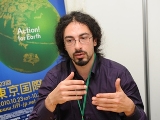2010.10.27
[Interviews]
Competition ŌĆ£And Peace on EarthŌĆØ Interview with Matteo Botrugno (Director) & Daniele Coluccini (Director) (10/27)


©2010 TIFF
---What does Rome mean to you both?
Matteo Botrugno (Botrugno): A big city with ghosts from the past and ancient Roman ruins all over the place. On the other hand, there are areas, as portrayed in our film, which are filled with the energy of violence, work and study. A 1km-long building was built there like a snake, and it was going to be linked to the center of town, but it has been left derelict for years.

©2010 TIFF
Daniele Coluccini (Coluccini):It lags behind in some areas compared to other European cities, but Rome is a city that is searching for something. The area in this film has a population of 14,000, but there is only one road leading to the central area. A small cosmos is formed where the residents live, separated oddly from the surrounding areas.

©2010 TIFF
---Rome has been portrayed in Roberto RosselliniŌĆÖs ŌĆ£Rome, Open CityŌĆØ towards the end of World War II, Federico Fellini on decadence in ŌĆ£La dolce vitaŌĆØ in the 1960s, and Pier Paolo Pasolini headed for the slums.
Botrugno: I would like to follow in the footsteps of these three, but we are closest to Pasolini. He dealt with the newly developed areas not only in films but also in poems and novels. No longer is the area overwhelmed by poverty and violence, as described in PasoliniŌĆÖs novel, ŌĆ£Ragazzi di vita,ŌĆØ but we wanted to show the alienated situation.
Coluccini: To feed themselves was important in those days. The youths stole to eat. But it is different now. It must be because of the TV, their desire to be like a celebrity is strong even if they are hungry.
Coluccini: The newly developed area of Corviale reflects the political situation similar to Naples. The administration does not do anything, so the residents are improving the environment by themselves, like installing street lights and elevators. The town is full of vigour to improve the place.
---How was the shooting?
Coluccini: People in Corviale accepted us. We were the first film crews in the area and their curiosity aided us in gaining their cooperation.
------The story starts when Marco returns to the town from prison, the impression is that Marco is the lead character, but as the story goes on, the three delinquents looked more like the true protagonists.
Botrugno: We wanted to baffle the audience a little, but Marco is the protagonist, although the three delinquents as well as Sonia, who works hard at university, play important roles. Also, only Marco is linked to various characters.
----Are the actors a mixture of professionals and local amateurs, like in PasoliniŌĆÖs film?
Coluccini: They are all professionals, most of them are from the theatre we often visit. So we wrote the script while visualizing each of them in our mind. Then we presented the script to them, and they agreed to perform.
---IsnŌĆÖt it difficult to co-write the script and co-direct the film?
Botrugno: Not at all. We tend to agree on many things, and if we donŌĆÖt the stronger opinion may win or we may compromise for a better result. Also, Andrea is there for script writing, so we can decide by majority vote if we cannot agree.
---What do you think of the two Sicilian directors, Daniele Cipr├¼ and Franco Maresco of ŌĆ£The Uncle from BrooklynŌĆØ and ŌĆ£Tot├▓ che visse due volteŌĆØ? I see them as two successors to Pasolini.
Botrugno: I find their films overly surreal and peculiar.
Coluccini: It may look as if they are soiling holy things, but it is not the case, and it is cohesive and acceptable. The violent scenes in our film are accompanied by religious music to reflect the Catholic feel (although we are not). This could have become a target for criticism, but it didnŌĆÖt. (It was more precarious than Cipr├¼ and Franco!)
If Pasolini was alive, I wonder which of the pairs, the Roman pair or the Sicilian pair, would he have favoured. The Roman pair face up to reality, and the Sicilians look to the past, but they are also the two essence of Pasolini.
(Interviewed by Chiseko Tanaka)
And Peace on Earth
Film Information




